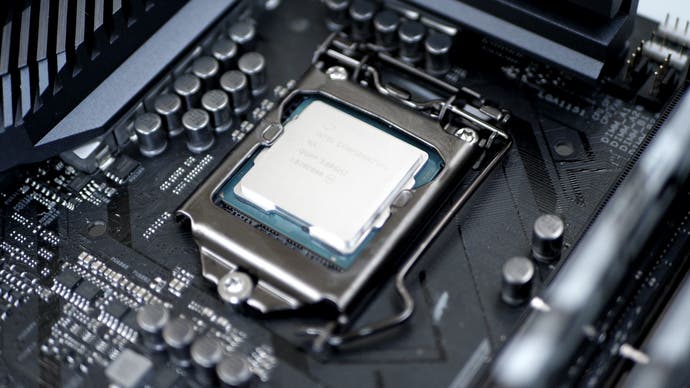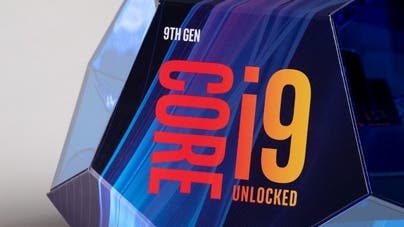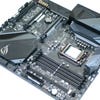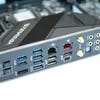Intel Core i9 9900K review: the fastest gaming CPU money can buy
High-end hardware - with a price to match.
Intel has been marketing the new Core i9 9900K as the fastest gaming CPU money can buy - and while a massive amount of controversy has surrounded the accuracy of pre-release benchmarks, the logic is sound. After all, the existing Core i7 8700K holds the title, ahead of its Ryzen 7 2700X competition. The new 9900K adds two additional cores and four threads, while boosting frequencies and increasing cache - improving on the 8700K in every way. Going into this review, my only question was this: to what extent do games actually make use of the additional resources? After all, the 8700K was already a performance monster, and arguably under-utilised. Do we actually need more gaming power?
Help comes in the form of Nvidia's recently released GeForce RTX 2080 Ti. It delivers a substantial increase in performance over the Pascal GPUs we've usually used for CPU performance testing, meaning that we have the graphics hardware to drive games faster, to even higher frame-rates. At 1080p, RTX 2080 Ti's silicon is blisteringly rapid, but staggeringly expensive - but the best of today's 'here and now' GPUs represents the mainstream not too far into the future. Although 1080p still rules, higher monitor resolutions are also gaining more popularity, so this time, our tests also include 1440p and 4K metrics. The prevailing notion is that at 1440p and higher, processor choice has little to no impact on performance but to what extent is this true?
But before we go on, a word on benchmarks and their effectiveness when assessing a CPU. For starters, most canned benchmarks provided in games only really test the graphics hardware, and don't run full game logic, making them pointless for CPU testing - something we've covered already. However, a new wave of tools built into games like Forza Horizon 4, Shadow of the Tomb Raider and Assassin's Creed Origins/Odyssey aim to test both CPU and GPU comprehensively, while Ashes of the Singularity and Gears of War 4 have been offering this kind of functionality for years. But for titles without this kind of detail or for games without benchmarks at all, performance differentials will be affected by the GPU you're using, the memory plugged into your system and sometimes even by the storage you're running games from. To cut a long story short: accurate CPU testing in games is challenging - and I'm still not entirely sure we're capable of showing you the full picture.

| Core i9 9900K | Core i7 8700K | Ryzen 7 2700X | |
|---|---|---|---|
| Cores/Threads | 8/16 | 6/12 | 8/16 |
| Single-Core Turbo | 5.0GHz | 4.7GHz | 4.3GHz |
| Max All-Core Turbo | 4.7GHz | 4.3GHz | 4.1GHz |
| Cache | 16MB | 12MB | 16MB |
| TDP | 95W | 95W | 105W |
This delicate equation is also impacted by what material you're testing. For example, we have separate CPU and GPU tests for what remains our go-to game for hardware stress-testing: Crysis 3. Using our GPU test with the RTX 2080 Ti, the Core i7 8700K commands a 12 per cent advantage over the Ryzen 7 2700X. However, in our CPU test, picked for its more strenuous demands on the CPU, the Intel lead rises to 18 per cent - and we're still GPU-bound in certain areas of this bench. So, in looking at CPU reviews - and yes, that include ours - we really do need to consider how effective percentage differentials actually are. The Crysis example clearly proves that they can change radically depending on what you're testing.
First up, let's take a look at the stats of the three main processors we have under the microscope. The Core i9 9900K is the first mainstream Intel CPU to deliver eight cores and 16 threads, making it a match for the Ryzen 7 2700X and offering a palpable advantage over the six-core/12-thread i7 8700K. In theory, the 9900K should deliver significant improvements in performance over both of its rivals. For starters, Ryzen is effectively two quad-core complexes attached via a relatively slow internal memory fabric - the i9 9900K's ring bus set-up sees all cores more closely integrated for lower latency. And of course, it's simply faster in frequency terms and has more processing power than the 8700K, while being based on the same architecture.
Our focus in this review is on gaming, but we did run some Cinebench R15 tests too, which target single-core and multi-core performance. It's a good, albeit basic benchmark for giving you an inkling on how the chip performs in non-gaming tasks. And it's at this point where another variable enters the mix - turbo boost on Intel's K chips. Pair a K chip with an overclocking Z board and engage a memory kit's XMP profile, and you usually enable a feature called 'enhanced turbo' or something similar. Intel's chips have maximum single-core and all-core turbo speeds out of the box. With enhanced turbo, the board ignores the all-core turbo limit and ramps it up to the single core max - so an 8700K runs flat-out at 4.7GHz rather than 4.3GHz, while (in theory at least), the new 9900K hits a stunning 5.0GHz.
| Core i9 9900K | Core i9 9900K Enhanced Turbo | Core i7 8700K | Core i9 8700K Enhanced Turbo | Ryzen 7 2700X | |
|---|---|---|---|---|---|
| Cinebench R15 Single-Core | 212 | 214 | 197 | 208 | 180 |
| Cinebench R15 Multi-Core | 1897 | 2189 | 1429 | 1552 | 1820 |
For its part, Ryzen's SenseMI technology does a pretty good job of getting the most out of the 2700X without the user intervening and without the need for an expensive, overclocking-focused motherboard. In tasks involving fewer cores, it'll hit 4.3GHz (the OG Crysis does this), while its all-core turbo tends to max at 4.05GHz to 4.075GHz. Of course, the Ryzen can be pushed further with a higher all-core turbo, but my chip struggles to sustain anything beyond 4.15GHz - in essence, AMD is already giving us almost everything it has to offer and tweaking all-core turbo may actually reduce performance slightly in single-core tasks.
The Cinebench table gives us a basic outlook of how Ryzen 7 2700X stacks up and how Z board 'automatic' overclocking can offer some useful boosts to performance. What's interesting here is that AMD's multi-core performance still beats out the 8700K handily and despite the new chip's many advantages, it's not too far behind 9900K performance.
However, with enhanced turbo active and a notional 5.0GHz across all cores, a 20 per cent lead in performance opens up. We aren't including 9900K enhanced turbo results in our gaming benchmarks because despite running the numbers, we spotted no difference whatsoever. This may well be down to the fact that during gaming, clocks actually varied between 4.8GHz to 5.0GHz for some curious reason - despite being nowhere near the thermal throttling limit.
Before we move on, let's quickly discuss our test set-up. The Core i9 9900K and Core i7 8700K ran on the Asus Maximus 11 Extreme motherboard using the new Z390 chipset, paired with two modules of GSkill Sniper DDR4 memory running at 3400MHz. Curiously, despite disabling enhanced turbo, the 8700K decided to run all cores at 4.7GHz anyway - 400MHz faster than it does on an MSI Z370 board we have. Frequencies were throttled back to the 4.3GHz spec to accurately map proper stock performance. The same memory at the same speed was run with the Ryzen 7 2700X, which operated on an Asus Crosshair 7 Hero mainboard. All games were run from a total of three Crucial BX500 SSDs. A Corsair H110i GT closed loop cooler was used on the Intel chips, with an EK Predator 240 in place on the Ryzen. In actual fact though, the 2700X's supplied cooler was perfectly fine with identical results, while more expensive water cooling is recommended for best results on the Intel chips.
The Maximus 11 Extreme is based on the new Z390 chipset, delivering native 2x2 AC WiFi and second-gen USB 3.1 - but really this is an evolution of the existing Z370 with little in the way of new, game-changing features. On the flipside, an existing Z370 board will run the new Intel processors just fine and the BIOS updates required to do that rolled out some time ago. For its part though, the Maximus 11 Extreme includes a colossal range of features. Yes, it has comprehensive Aura RGB lighting, an OLED display that helpfully monitors CPU temperatures, along with Asus's signature extreme levels of backplate IO. Designed for overclocking, all the headers you'll need for liquid cooling are present and correct, while Asus opts for SupremeFX S1220 eight-channel sound and a high-end DAC. Two eight-pin CPU power inputs are also delivered - quite possibly overkill, but overkill seems to be the prevailing philosophy behind this board. It's beautifully built, it has to be said.
Intel Core i9 9900K analysis












